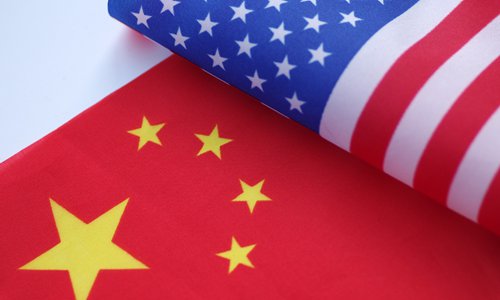HOME >> OPINION
Detractors drive US bitterness against China
By Zhao Minghao Source:Global Times Published: 2019/7/28 19:03:40

Photo: VCG
The Trump administration's China approach recently triggered a new round of debates within the US, with both sides of the aisle expressing their views through open letters to US President Donald Trump. Amid growing bilateral tensions, the US narrative on China is being metamorphosed.
On one side are well-known scholars and former government officials who have long studied China. They suggest that China is not an enemy, and the US approach "must be based on a realistic appraisal of Chinese perceptions, interests, goals and behavior." They also believe that many US moves are contributing directly to turning the relations into a tailspin. The open letter they signed is intended to show "there is no single Washington consensus endorsing an overall adversarial stance toward China."
On the other side are former US military and intelligence officials as well as hawkish China watchers. They have urged the Trump administration to stay the course on its path of countering China, emphasizing that the strategic interests of China and the US are "antithetical." The open letter was written by James E. Fanell, former director of Intelligence and Information Operations for the US Pacific Fleet, who has long accused China of preparing for war. The signatories include China detractors such as Gordon Chang, who have been predicting the coming collapse of China.
The debate indicates that there are varying perceptions on China within the US. Military and intelligence officials are used to thinking about the worst-case scenario. Lacking adequate knowledge, they tend to compare China to historical adversaries of the US: Nazi Germany and the former Soviet Union. This undoubtedly will lead to strategic blindness. Fanell wrote in the open letter: "In our political system, politics is the norm, and war is the exception. It is explicitly the opposite in the PRC's worldview." Anyone who has some knowledge about the history of American wars will find such a view ridiculous.
What riles Chinese analysts is Washington's new ideological fusillade against China with the Communist Party of China in the cross hairs. This will undermine the foundation of bilateral relations. Although the Trump administration defined China as a strategic competitor, it has in fact treated China like an enemy. But according to late Harvard political scientist Samuel P. Huntington, "The ideal enemy for America would be ideologically hostile, racially and culturally different, and militarily strong enough to pose a credible threat to American security."
From 2008 when the US began to hype up "state capitalism" to a debate about China's so-called sharp power in 2017 and warnings against a "clash of civilizations" with China in 2019, the US perception of the "China threat," especially over ideology, has reached new heights. Various factions which support a tough approach for China close ranks to up the pressure on Beijing. For instance, they recently accused China of techno-authoritarianism.
The Trump administration is seeking to rationalize its confrontational approach by purposely reshaping the US society's perception of China. Unlike its predecessors, the Trump administration pays little attention to opinions of think tank experts in its policymaking for China. White House insiders Peter Navarro and other anti-China hawks are only willing to engage with scholars such as Michael Pillsbury, writer of The Hundred-Year Marathon: China's Secret Strategy to Replace America as the Global Superpower.
US Secretary of State Mike Pompeo once served as the director of the Central Intelligence Agency, which is largely behind his deep-rooted hostility against China. Worries about "clash of civilizations" with China are dominating the discussion on China within the US State Department. US national security adviser John Bolton has not yet visited China since he assumed the position. Officials in charge of China affairs in National Security Council, the State Department and the Pentagon are almost all anti-China hawks.
There is no doubt that for quite a few US policy elites, China has surpassed Russia to become a thorny diplomatic topic in the medium to long term. As US scholars Jonathan D. Pollack and Jeffrey A. Bader said in their article "Looking before we leap: Weighing the risks of US-China disengagement," to many Americans, "the defining question is no longer how to manage relations with China, but how to counteract and (if possible) impede China's advance to major-power status."
Beijing has clearly recognized this change. But confrontation is never a sensible solution. To avoid the two big powers eventually falling out, more talks are needed now. Keeping debates open can inject more resilience into policymaking. However, it's worrying that Washington now has been shrouded in a new red scare.
The author is a senior research fellow at the Charhar Institute and an adjunct fellow at the Chongyang Institute for Financial Studies at Renmin University of China. opinion@globaltimes.com.cn
Posted in: VIEWPOINT